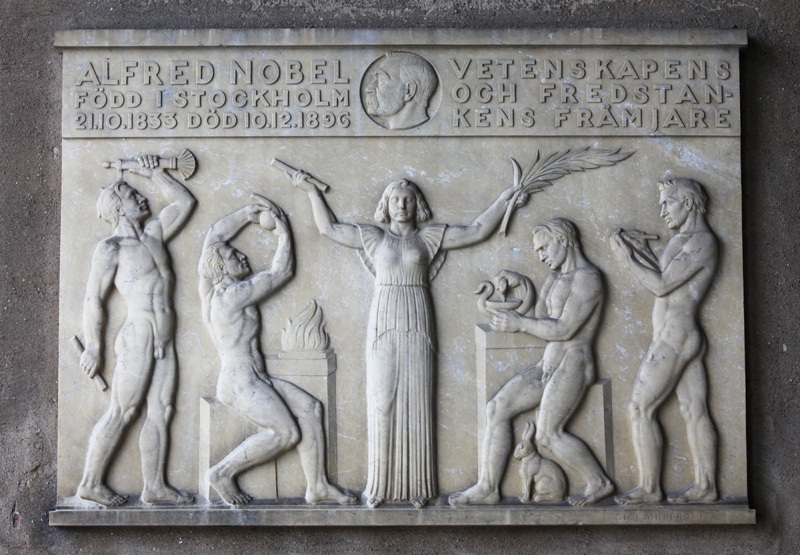Nobel Prizes Announced This Week: How to Watch Live

Continuing a 113-year-old tradition, the Nobel Foundation in Stockholm will award the 2014 Nobel Prizes beginning Monday (Oct. 6) to the best and brightest minds in their fields — or, as the prizes' founder, Alfred Nobel, described it, those who have bestowed the "greatest benefit on mankind."
You can watch a live webcast on Live Science of the Nobel Prize announcements beginning at 5:30 a.m. EDT (11:30 a.m. local time in Sweden), when Göran Hansson, secretary of the Nobel Committee for Physiology or Medicine, will announce the Nobel Prize in medicine.
Each day will bring new Nobel Prize recipients. Staffan Normark, permanent secretary of the Royal Swedish Academy of Sciences, will announce the Nobel Prize in physics at 5:45 a.m. EDT at the earliest (11:45 a.m. Swedish time) on Tuesday (Oct. 7). [Watch Live: This Year's Nobel Prize Announcements]
The prizes for chemistry, peace and economics will be announced Wednesday (Oct. 8), Friday (Oct. 10) and Monday (Oct. 13), respectively. Per tradition, the Swedish Academy will set the date for the Nobel Prize in literature at a later time.
Through the years, some Nobel laureates have stood out more than others. For instance, Nobel winners are typically in their 50s and 60s, but the youngest winner, Lawrence Bragg, was just 25 when he received the 1915 Nobel Prize in physics for his work examining crystal structures with X-rays. The oldest person to win the award, Leonid Hurwicz, won the Sveriges Riksbank Prize in Economic Sciences in 2007 at age 90.
Iconic and instrumental people and organizations have won Nobel prizes. Last year, the Organisation for the Prohibition of Chemical Weapons won a peace prize for its work in eliminating chemical weapons in Syria. In 1962, Francis Crick, James Watson and Maurice Wilkins won the physiology or medicine Nobel for discovering the molecular structure of DNA. (Famously, Rosalind Franklin, who helped with the discovery, did not posthumously receive the award.)
For all their pomp and circumstance, Nobel Prize selections are sometimes controversial. For example, Portuguese neurologist António Egas Moniz won the 1949 physiology prize for developing the prefrontal lobotomy. In the procedure, now considered deeply unethical, doctors once operated on the mentally ill, depressed or learning-disabled, cutting a key connection in the prefrontal region of the brain that can lead to a vegetative state.
Sign up for the Live Science daily newsletter now
Get the world’s most fascinating discoveries delivered straight to your inbox.
Last year was a big one for physics, as Peter Higgs, of the United Kingdom, and François Englert, of Belgium, snagged the physics prize for predicting the existence of the elusive Higgs boson particle, which is thought to explain how other particles get their mass. The particle was finally detected at the world's largest atom smasher, the Large Hadron Collider, in 2012.
The prizes have a storied history. Nobel, the inventor of dynamite, was dismayed when a newspaper mistakenly published his obituary and called him the "merchant of death" for his creation. To brighten his legacy, Nobel left the vast majority of his fortune to fund prizes in physics, chemistry, medicine, literature and peace. His predecessors awarded the first Sveriges Riksbank Prize in Economic Sciences in Memory of Alfred Nobel in 1969.
Nominating a contender is a lengthy process that begins in September, more than a year before the prizes are announced. Only people who have an official invitation or the proper qualifications can nominate a person for the prizes. Then, the Royal Swedish Academy of Science, the Nobel Assembly at Karolinska Institutet in Sweden and the Norwegian Nobel Committee pick a winner based on recommendations from experts in each field.
The prizes are given to each Nobel winner, called a Nobel laureate, in December.
The Nobel Prizes aren't the only awards in town. In September, an annual parody of the awards, called the Ig Nobel Prizes, gave recognition to a number of doozies, including researchers who examined the slipperiness of banana peels and the psychopathic tendencies of night owls.
Check out discussions on social media at #NobelPrize2014.
Follow Laura Geggel on Twitter @LauraGeggel and Google+. Follow Live Science @livescience, Facebook & Google+. Original article on Live Science.

Laura is the archaeology and Life's Little Mysteries editor at Live Science. She also reports on general science, including paleontology. Her work has appeared in The New York Times, Scholastic, Popular Science and Spectrum, a site on autism research. She has won multiple awards from the Society of Professional Journalists and the Washington Newspaper Publishers Association for her reporting at a weekly newspaper near Seattle. Laura holds a bachelor's degree in English literature and psychology from Washington University in St. Louis and a master's degree in science writing from NYU.









